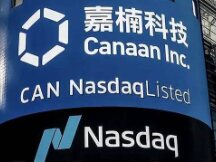Zhang Nangeng, CEO of Canaan Technology: AI chip enters second round
On December 10, Zhang Nangeng, President and CEO of Canaan Technology, received an exclusive interview with the 36Kr reporter.
Interview details
In the first half of 2021, the big business of the home AI industry hit new highs with just 23 jobs, indicating that the home AI industry has entered the water.
As AI enters the landing phase, paper consumption patterns such as chip pages and symbols will be reduced, and AI chip companies with more industry knowledge and data output will become more efficient.
Canaan has supported an existing team that can be realized throughout the chip front-end and back-end R&D process.
Unlike some in-store developers who buy and share IP tasks, Canaan Technology has a rich in-house IP matrix design.
The development of more PI in internal research is testing the entry of other groups such as technology, design and algorithms.
Growth of R&D investment management for three consecutive years, and in the first quarter of 2021, R&D investment will exceed 200 million yuan.
After two years of research, Canaan entered products for the smart home, smart home, and other markets.
This is the whole interview
The concept of an “AI chip” is not new to the industry.
Leveraging the advantages of intelligent technology and on-chip semiconductors, the AI chip industry has grown at a remarkable rate in recent years. According to data from Jiwei Consulting, from January to April 2021, the financial volume of China's AI chip industry reached 8.965 billion yuan, maintaining rapid and steady growth.
However, only 23 financial projects can reach 9 billion yuan, and the average project budget is over 300 million yuan, which is higher than the average budget at the time of the project. An AI chip appears.
Do not believe it.The AI chip industry is going mainstream.
The second battle of the AI chip
With the advent of AI algorithms, the demand for power meters increased, and Nvidia took the opportunity to soar into the sky, and a high AI chip was born.
In the early days of the concept of “AI chip”, many domestic and foreign markets sprang up. Most of the early groups were committed to the “0 to 1” solution based on their training. "and" from nothing. "Problem.
Since then, AI chips have exploded and the battle of hundreds of demand schools has begun over the years as technology companies, industry experts, end-product users, and others get into the game.
This is the first battle for the AI chip. No established business or customer needs, the company's performance brand is only determined by company data, chip information and group learning history.
Since then, as the industry increasingly embraces the concept of "AI chip", technologies, products and applications have gradually matured. Entrepreneurs and end users alike have changed their hobbies from learning to marketing, and the battle for AI chips has silently changed.
In this second battle, a group of “new cadets” with advanced technology and rich industry stand out and become star players of the second level.
For example, Canaan Technology, with 8 years of chip R&D experience, successfully landed on Nasdaq in November 2019, became the first Chinese company to chip an AI chip with independent technology.
In this second battle, the lack of PPT, financially, has become the second priority, and the industry has paid more attention to the landing, application and ecology of AI chips. .
In fact, Canaan Technology CEO Zhang Nangeng said in an interview with 36Kr that the demand for the AI chip application industry has grown rapidly in recent years and the industry continues to grow. Today, Canaan Technology's AI chip has grown rapidly and achieved market share in the areas of AI STEAM training, smart home and smart sensors.

(Canaan Technology President and CEO Zhang Nangeng)
14 cassettes released, 100% success
The diamond of modern industry, the semiconductor chip is the standard "Focus on capital, skills and technology“High barrier industry.
Take Intel, for example, the world's leading chip maker. With a history of over 40 years, the old chip company continues to invest heavily in research and development technology every year. According to the financial report, Intel's total investment in research and development is as follows: in 2020, it will exceed $ 135.56 billion, or 86 billion yuan.
In addition, high-investment R&D is different from Internet and algorithmic R&D, which is designed for “small steps, fast iteration and error”. Another problem for the chip industry is the long R&D cycle and the high risk. , and the cost of trial and error is very high.
This is especially true of technologies such as “AI chips” which have not yet been clearly defined.
With the investment in R&D and marketing of algorithms, the cost of registering AI chips can reach 10 million yuan, and the R&D cost of the process the highest below 10nm up to hundreds of millions of yuan. Tape removal does not waste a lot of energy and equipment.
Therefore, it is not only to invest people and equipment, but also to bring together industry knowledge and rich industry knowledge of AI chip R&D and team engineering.
However, intellectual differences are still a major challenge facing the home business.
According to data from "China Integrated Circuit Industry Talent Development Report (2020-2021 Edition)", our domestic industrial integration is currently in the process of exporting and developing. , and industry wages have increased. In 2020, they will be 541,000. By 2023, demand in global markets is expected to reach around 7,665,000, and diversification is expected to be significant.
This is why the salaries of semiconductor engineers have increased so much in recent years, and many companies with advanced engineering skills are willing to pay two or three times for advanced technology. .
According to data from 51job.com, the average salary increase for IC / semiconductor graduates is expected to be 20-25% higher in 2020, unless the salaries of 55 graduates see their business growth increase at the same time.
Due to the lack of visibility in the market, many late-operating AI chip companies still face significant challenges in uniting the technologies.
However, in the case of Canaan Technology, which was established in 2013, this problem does not appear to be serious.
As of 2013, intelligence had not yet left the lab and “change in the house” was still in its infancy. Public knowledge of the "chip" remains unknown, and it is difficult to predict whether it will spread across the country in a few years.
Based on the use of technology that requires advanced engineering capabilities to manage, the integration and penetration of R&D and chip engineering teams, and industry knowledge of the chain are particularly important. In this context, Canaan Technology, which was the first to cut the blockchain chip, has a better place in the first place.
Zhang Nangeng now speaks to 36 Krypton:Canaan Technology has trained an existing team of self-design engineers experienced in front-end, back-end and chip proof., instead of outsourcing the backend of the company to a team like some companies of the same size.
At the same time, Canaan Technology has set the highest standards in physical design and backend functionality and is able to streamline data output and create a variety of design processes through collaboration with multiple corners.
At the start of 2016, Canaan Technology was one of 10 domestic chip companies to have already completed 10nm technology. In 2017, Canaan Technology became TSMC's first 7nm partner. In 2018, Canaan Technology announced the world's first 7nm ASIC chip.
Zhang Nangeng said, "Jianan has maintained 100% success in the last 14 tapes."
Currently, Canaan Technology's industry is the development of chip and blockchain technologies, as well as the research and development of AI chips for terminals.
These are two chips that appear to have different applications, but Zhang Nangeng said 36Kr has a significant difference in technology output.
For example, as the application of the AI algorithm model gradually develops, the end-side AI chip is developed in the direction of high performance and low power consumption.
High efficiency is intended to continuously improve user experience and meet customer needs, while using less energy due to end applications. .
However, “high” and “low” energy consumption is both inconsistent and difficult to balance.
But fortunately, these two characteristics are one of the biggest challenges that Canaan Technology's old blockchain chips have to overcome. Blockchain chips not only have special requirements for the operation of computing, but also reduce the incidence of power consumption.
As a result, Canaan Technology, which entered the chip chain chip market for many years, has accumulated rich experience and many technologies can provide the best food for AI chip design.
However, as they run two large companies at the same time, the division of labor and the integration of buildings also pose economic challenges for Canaan Technology.
As a result, Canaan Technology developed the entire process, from the design of the FinFET SPICE simulation to the Post-Si post-Si proof, including pre-commercial research, definition of chip specifications, front -end of all the architecture, compiler, algorithm and software architecture developed in collaboration. .
Zhang Nangeng said 36Kr is part of the in-house intellectual property design. This is because Canaan Technology has created more IP developments in-house that chip companies have always wanted to include in several groups, such as integration algorithms, design and implementation. and packaging design. , to measure the flow rate of different joints.
With 8 years of growing industry, Canaan Technology has been fully trained in various fields of research and has accumulated extensive experience in R&D and various patented technologies.
To date, Canaan Technology holds 349 patent property rights, 70 integrated circuit design rights and 105 software copyrights.

At the same time, unlike some chipmakers who buy and repeat IP tasks, Canaan Technology has a rich in-house developed IP matrix. The hardware includes self-developed processor, KPU neural network acceleration engine, high speed PHY transmission, etc. The software includes compilers for all Kanzhi AI chips and algorithm software optimized for IP kernel performance.
Currently, Canaan Technology has more than 360 employees, of which about 70% are R&D staff, and the annual R&D revenues have increased in total.The annual growth of R&D capital from 2016 to 2019 is respectively 150%, 226% and 43%..
In the first quarter of 2021, Canaan Technology's R&D investments exceeded 200 million yuan.
Aiming for the AI chip from the end face
Unlike most AI chip companies in the market, Canaan Technology is one of the leading companies in China adopting RISC-V instructions configured to develop final AI chips. This year alone, Canaan Technology launched its own 2nd Generation KPU2.0 IP Core Architecture and Kanzhi K510 chips for the end-side AI chip industry.
Currently, Canaan Technology's AI chip has achieved AI STEAM education, school education and research, smart home and smart home planning.
For example, during an outbreak, Canaan Technology worked with US sensor maker VergeSense to develop a smart sensor based on an AI chip to detect human flows and interactions in offices and for alerts based on the AI chip. force of human flow.
In the wake of AI STEAM training, Canaan Technology has partnered with YouBexuan robotics to develop a smart home programming block called Ukit2.0 based on the K210.
In the field of smart home, Canaan cooperates with Guangzhou Angbao Electronics to install various products such as smart face cat eye door lock, smart face network door lock, 4G router and metal customer service with Kanzhi AI chip.
In the first battle, which marks the beginning of the rise of the AI chip concept, the market does not understand AI chips, end users cannot create, and developers cannot clearly know their specific needs.
Zhang Nangeng told Krypton 36 that the company's first-generation AI chip, Kanzhi K210, encountered major difficulties in the upgrade and landing process.
At first, Canaan Technology's business plan for the Kanzhi K210 was more than just a gas chip: "Build a chip, prepare a document, promote it in the community and by other means ...".
However, for the first month or two, the success of this marketing campaign was unsatisfactory.
First of all, the chip belongs to the flow of commercial products, and the product indicates that the cycle is usually long, and the longest is 2-3 years.
Second, AI chips are not only "new gadgets", but also have a big impact on the use, want users to keep the AI algorithms, data, training, etc., that various manufacturers of terminal equipment does not manufacture. yes- "not everyone knows what your chip can do".
Later, Canaan Technology began to gradually reorganize the business concept, first, in support of electronic devices, developing POC (proof of concept) products of its own imagination, so that users can see the reality of Kanzhi AI. inches, so rational performance It raises expectations.
As a result of the Spring Festival 2018, Canaan Technology researched and refined its industry knowledge and gradually developed commercial products, covering algorithms, chips, modules and solutions such as smart door lock modules, access control systems by sensor and even intelligent. Manufacturers of devices with a wide range of capabilities, such as measurement capabilities, can access them when needed, supporting the commercialization of AI chips.
At the same time, Canaan Technology is stepping up by iterating its AI chips every two years for the research and development of the new K510 chip to absorb more user feedback from the previous chips and have a greater impact. on specific products. In the high-end vision industry, the basic IP architecture has been revamped and new technologies such as TOF have been tried out to meet the needs of users in emerging markets such as smart home robots and aerial photography. unmanned.
For example, in July this year, Canaan Technology and robot dog startup Lu Wu Intelligent signed a joint venture in AI intelligent education hardware store, and the next-generation desktop product XGO-mini is equipped with a chip Kanzhi K210.

On Kickstarter, foreign financial services provider Luu Smart XGO-mini raised more than $ 70,000 in 12 hours of advertising, sparking market interest. The XGO-mini robot dog developed by Lu Wu Intelligent has 12 degrees of independence, so it can perform various directions, and also can perform applications such as commands and tracks. This not only places higher demands on the performance of Kanzhi AI chips, but also opens more market space and impact of Kanzhi AI chips.
xaus
About five years after the fire, the AI chip was about to roll out of the lab's ivory tower and slowly begin a massive commercial operation.
Zhang Nangeng said that at 36 Kr, many users can build AI chips this year, and everyone can see that many users have their own AI algorithms. The market is mature and application scenarios are multiplying.
But at the same time, in today's AI consumer market, there is still a huge difference between actual user experience and expectations, so Canaan Technology experts will need to keep researching and thinking how to get basic results. Latency, lower power consumption and higher power consumption provide better user experience.
“We know that improving the current process is not limited to the Moore Code,” said Zhang Nangeng.New requirements, including deep learning and blockchain, have forced people to rethink the design to lower energy costs and improve performance., solves current personal information and information intelligence problems in people's lives. "
"That's what Canaan did."

Scan QR code with WeChat






























